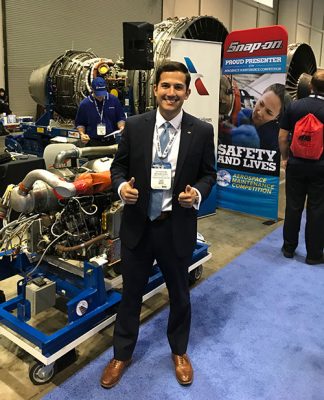“When I was hired in July 2017 to work for Bank of America Merrill Lynch in Miami, my new boss said that she viewed my working towards earning the MSA as a huge benefit for the bank. It definitely helped me get the job.” – Jefferson Betancourt, MS in Accounting graduate, UConn

After earning an MS in Accounting from UConn, Commercial Banking expert Jefferson Betancourt now feels like he can talk shop with accountants.
Making the Transition
Jefferson Betancourt had been working in the finance industry since graduating from college in 2011, when he decided he wanted to take his career to the next level. He set his sights on earning an MS in Accounting (MSA) for one simple reason. He felt that this credential, in addition to his undergraduate degree in finance, would give him a significant competitive edge—and the potential to get a job with greater responsibility and a higher salary.
There was just one problem. He didn’t have the prerequisites required to apply for a master’s level program. After doing some research online, he discovered the University of Connecticut’s online Certificate in Accounting Fundamentals. It seemed like it was created just for him! As Jefferson explains; “The description said ‘Applicants who have an undergraduate degree who were not accounting majors will be considered for admission.’ That was me!”
Jefferson also learned that when he had completed the four courses, he could automatically enroll in UConn’s MS in Accounting. Even better? Credits from two of the four courses would roll right over into the MSA. And best of all, says Jefferson, “When I did a search for the top online MSA programs, UConn’s ranked second. And it was $20,000 less than another program I was looking at here in Florida.”
Getting off to a great start
Jefferson started his Accounting Fundamental course work in the fall of 2015, completing it the following spring. Shortly thereafter, he jumped right into the MS in Accounting program, which he earned in May 2018.
By far one of Jefferson’s favorite parts of the program was the required in-residence course (ACCT-5505 – Understanding the Responsibilities of an Accounting Professional). While he could have taken this anytime during the program, he felt it was important to take the seminar first. “I really liked that I could put a face to a name of many of the people I would be going through the program with, including one student who I worked with on various group projects and even walked with at graduation. The in-residence course also gave me the chance to meet the faculty. I left feeling a real sense of connection with UConn and its campus.”
Jefferson also greatly appreciated the flexibility of the coursework. “There were two required courses, but other than that, the rest was up to me. And with so many different electives, you can choose courses from the area you’re most interested in.”
The competitive edge
While he was doing his certificate coursework, Jefferson began looking for new job opportunities. “I wanted to work for a global bank,” says Jefferson, who at the time was working as a Senior Credit Underwriter at TD Bank in Miami. “Because I was already enrolled in the MSA program at UConn, I was able to include it on my resume, listing 2018 as my graduation date. When I was hired in July 2017 to work for Bank of America Merrill Lynch in Miami, my new boss said that she viewed my working towards earning the MSA as a huge benefit for the bank. It definitely helped me get the job.”
As you can imagine, that was a very busy time for Jefferson. The fact that the courses were online made a big difference, allowing him to work at his own pace and on his own schedule. He also appreciated being able to use Google Hangouts, which made collaborating on group projects much easier. “We would all set a meeting time. Once we logged in, you could actually see the faces of your classmates via webcam and you could see each other’s comments being typed as we worked together on assignments.”
Thinking like an accountant
Most importantly, Jefferson says the content of the program gave him the insights and knowledge he needs to think from an accountant’s point of view—so important because at Bank of America, Jefferson is responsible for evaluating whether a potential client fits the risk profile of the financial institution.
“Having earned the MSA has given me a much greater understanding of tax structure, forensic accounting, and how to use internal accounting controls to prevent misstatement of information. I feel like I have a better ability to understand how my clients think from an accounting perspective.” For example, he says that because of his knowledge of Accelerated Depreciation, he was able to advocate the financial position for a prospective client and make a case to the risk department. “We were able to onboard the client to the bank and close a $5 million deal that we might have otherwise passed on.”
Unlike many of the students in the MS in Accounting program who earn the credential specifically to get the required credits to take the CPA exam, Jefferson doesn’t plan to go down that road. As he tells prospective students who ask him about his experiences:
“The program does a great job of taking someone, like me, who had minimal formal accounting education and gives them the knowledge they need to walk the talk. And it’s great for working professionals. If spring is your busiest time, just take one course, then double up during the summer. It’s customized to the individual student; you dictate how quickly or slowly you want to graduate.”